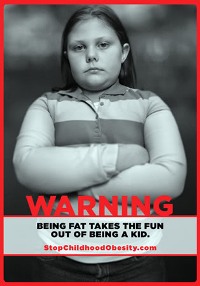 Recently, Children’s Healthcare of Atlanta launched an aggressive ad campaign targeted squarely at Georgia’s staggering childhood obesity epidemic. The ad campaign uses stark imagery and emotional messaging to reach the parents of the growing group of obese children. While critics blast the ads, the reoccurring sentiment is that while these ads use a more dramatic approach, these are the issues that need to be dealt with.
Recently, Children’s Healthcare of Atlanta launched an aggressive ad campaign targeted squarely at Georgia’s staggering childhood obesity epidemic. The ad campaign uses stark imagery and emotional messaging to reach the parents of the growing group of obese children. While critics blast the ads, the reoccurring sentiment is that while these ads use a more dramatic approach, these are the issues that need to be dealt with.
The ads show young, sad, overweight children with a warning label below them featuring messages like “My fat may be funny to you, but it’s killing me.” The public’s response has been mixed, but one thing is clear: desperate times call for desperate measures. “They are in your face,” said Gayla Prestage Grubbs, mother of an overweight 15-year old struggling with weight related issues. “But I know, for me, I was not offended by it. I was more like — oh, my gosh, that’s right.”
On twitter, the response was much the same. Taking the ad’s message one step further, @BarkingUnicorn tweeted: Another question that parents don’t want to answer: “Mom, why am I fat?”
According to the 2026 Georgia data report (PDF), 24% of third graders were considered obese. The report attributes the following behaviors to the high percentage of obese children:
- Only 5 in 9 (52%) middle school students and 4 in 9 (43%) high school students in Georgia meet the Centers for Disease Control and Prevention requirements for recommended physical activity.
- Over 2 in 5 of Georgia’s middle school students (44%) and high school students (39%) watch TV for 3 or more hours on a school day.
- Only 1 in 6 (17%) high school students in Georgia consume 5 or more servings of fruits and vegetables daily.
